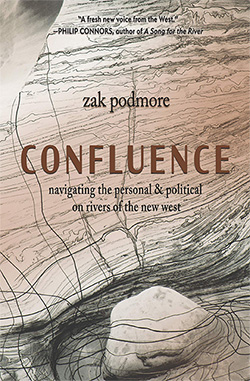Confluence opens with a harrowing scene of Zak Podmore’s mother surviving a scary spill in the Colorado River in a hydraulic in the Big Drop rapids known as Satan’s Gut. “Directly downstream the Gut heaves in a gnashing pit of foam large enough to swallow a Winnebago,” writes Podmore.
 The frightening moment, which happened before Podmore was born when his mother was 25 years old, became a legend in family lore. Young Zak was born and raised to run rivers; he rode his first currents in a child’s car seat strapped to the wooden deck of an Army surplus raft.
The frightening moment, which happened before Podmore was born when his mother was 25 years old, became a legend in family lore. Young Zak was born and raised to run rivers; he rode his first currents in a child’s car seat strapped to the wooden deck of an Army surplus raft.
In Confluence, Podmore processes the premature death of his mother (at age 52, from lung cancer) and takes readers on six trips around the American West in a stirring blend of nature writing, journalism, and personal reflection.
Podmore’s credentials are solid. He has written for Outside Online, Four Corners Free Press, High Country News, Salt Lake Tribune, Canoe & Kayak, and Huffington Post. He’s won awards from the Society of Professional Journalists’ Colorado chapter and Folio magazine. And he’s worked as a river ranger in Bears Ears National Monument. Based on the paddling he’s done, his arteries are flush with spring runoff.
The majority of the slim book of essays (only 150 pages) focuses on the environment and issues that pressure rivers and river country in Utah, Colorado, Arizona, the Colorado River delta in northern Mexico, and Washington State. Podmore’s writing is keen-eyed and colorful, whether contemplating the legacy of uranium mining and the related impacts on Native American tribes in the opening essay, “Home Sometime Tomorrow,” or chasing the end of the Colorado River outflow in “The Delta.”
“Home Sometime Tomorrow” is particularly powerful as Podmore gives voice to the Ute Mountain Ute elders who are protesting the ongoing operation of a uranium mill near the village of White Mesa. Tribal leaders fear that poorly stored wastewater seeps into their drinking water. Podmore lives nearby but recognizes his ability to move if needed. The tribe has no such choice.
In fact, Podmore recognizes both the ironies and impacts from the changing demographics in the Four Corners region — and the expectations among those newcomers.
“We keep arriving. Parasites who produce nothing,” he writes. “Who don’t want to gather our own firewood but complain about the drill rigs going in. Who pretend beef comes from supermarkets and that hummus is food. Who talk about the changing climate but who always seem to be driving or flying off to exotic vacations … Who imagine ourselves allied with the Native American communities even as we move in and crowd the homeland as so many others have before.”
The last of the six principal essays (“The Dam”) is a grueling, cold trip to the Pacific Northwest to look at the removal of two hydroelectric dams on the Elwha Rivers — dams that destroyed the livelihood of the Lower Elwha Klallam people, who relied on the salmon in the river’s waters.
Podmore abandoned work on a degree in philosophy when his mother was first diagnosed and in Confluence he packs the dry bags for his river runs with big ideas from Georges Bataille, Edward Abbey, Charles Bowden, Immanuel Kant, Standing Rock Sioux scholar Vine Deloria Jr., Aldo Leopold, Henry David Thoreau, and many others. One gets the feeling that Podmore is a happy searcher, a guy with more questions than answers. Confluence packs a lot into these brisk journeys.
“Everything is held together with stories. That is all that is holding us together, stories and compassion,” wrote the nature writer Barry Lopez, who died late in 2020. We should all be glad that writers like Zak Podmore are out there telling stories — with compassion.
Mark Stevens is the author of The Allison Coil Mystery Series. Book three in the series, Trapline, won the Colorado Book Award for Best Mystery. Mark also hosts the Rocky Mountain Writer podcast for Rocky Mountain Fiction Writers. Mark lives in Mancos, Colo.








